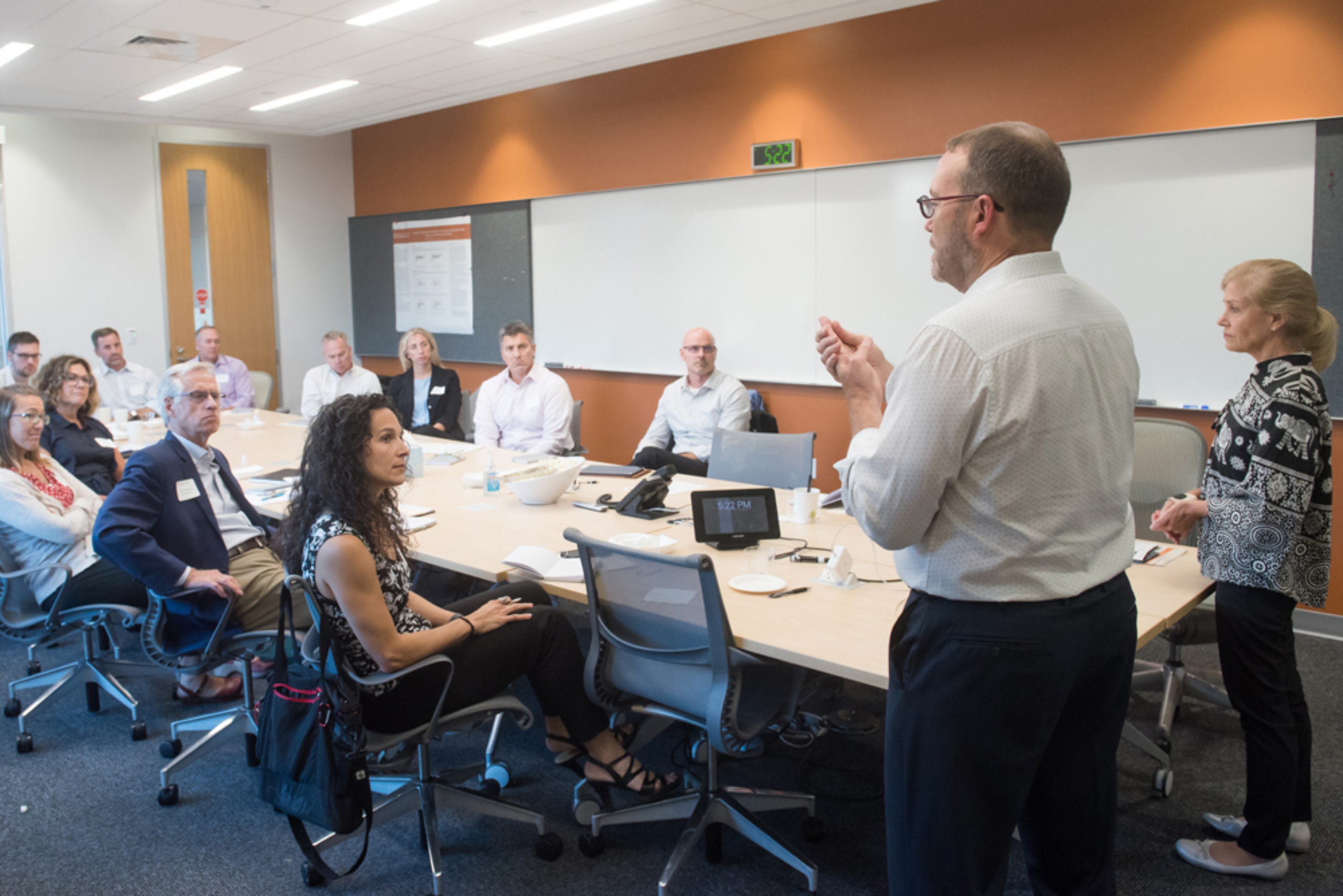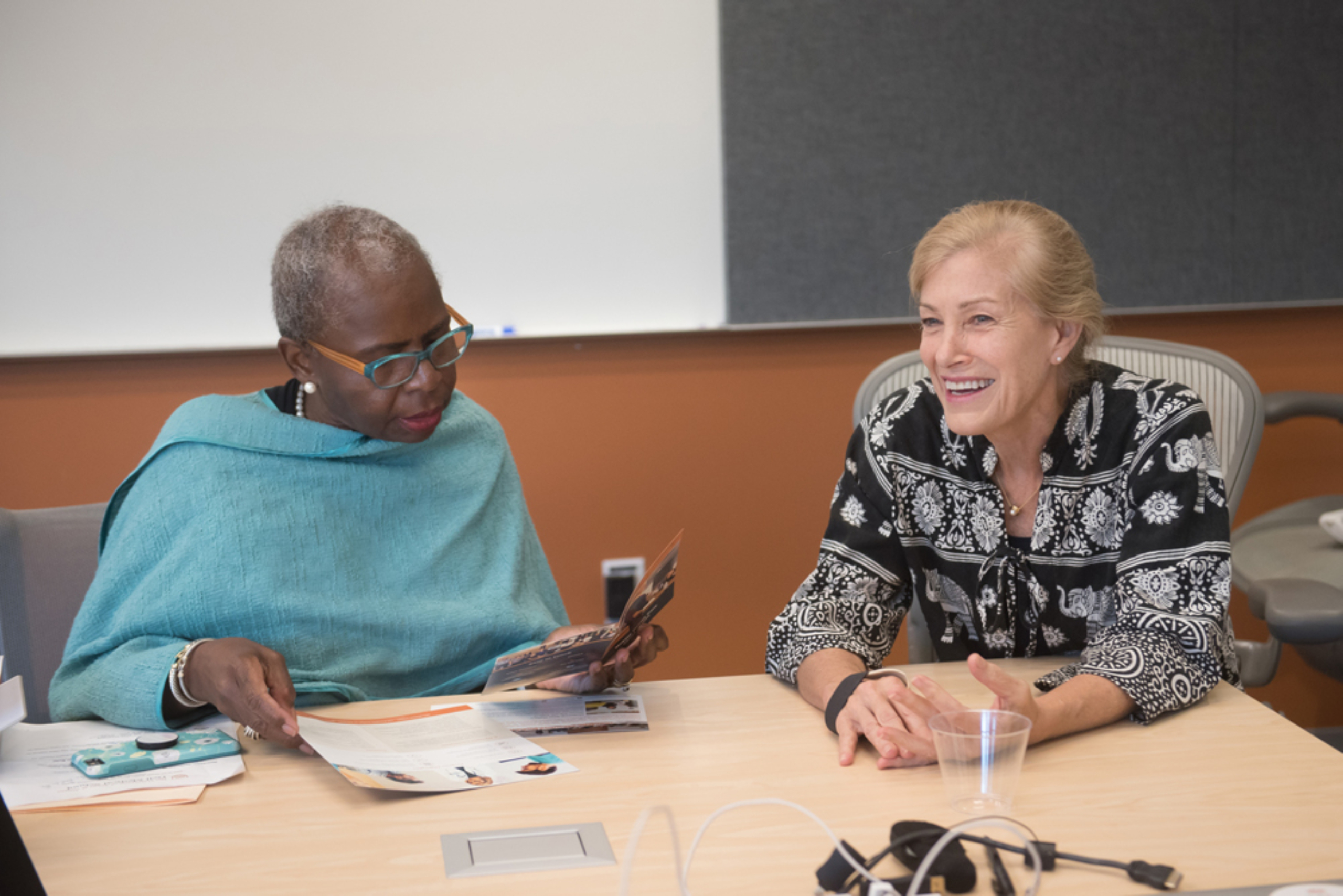Immersion Program in Value-Based Health Care
The Musculoskeletal Institute at UT Health Austin, Dell Medical School’s clinical practice, invites you to learn firsthand how to design and implement value-based care models within your own organizations.
Meet the institute’s providers and business leaders, interact with clinical and operational representatives from leading institutions across the country and learn how to create your own value-based health care models.
Upcoming Session
Thursday, September 10 — Friday, September 11, 2026
Agenda
The agenda is subject to change based on facilitator availability.
- What is value-based health care? — Kevin Bozic, M.D., MBA
- Nuts and bolts of integrating a PRO platform — John Wickman, M.D., MBA and Ariel Hortert, M.S.
- AI integration — Prakash Jayakumar, M.D., Ph.D.
- Introduction to the perioperative surgical home — Thomas R. Vetter, M.D., MPH
- Interactive tour of the Health Transformation Building and Musculoskeletal Institute
- Interactive discussion of the Musculoskeletal Institute to include exam rooms, bullpen process and radiology suite
- Integrated Practice Unit team huddle — Karl Koenig, M.D., M.S., and providers in the Musculoskeletal Institute
- Multidisciplinary team panel with providers in the Musculoskeletal Institute’s Lower Extremity IPU, moderated by Ariel Hortert, M.S.
- Development of the Spine IPU — Mark Queralt, M.D.
- Analytics in VBHC and patient-reported outcome measures, or PROMs — Prakash Jayakumar, M.D., Ph.D.
- Driving change in delivery and payment models — Prakash Jayakumar, M.D., Ph.D.
- Reflections — Kevin Bozic, M.D., MBA, and Karl Koenig, M.D., M.S.
About the Program
The two-day Immersion Program in Value-Based Health Care is held throughout the year and brings together like-minded clinicians, payers/purchasers, digital health companies and others who are interested in health transformation related to musculoskeletal care. Engage with leaders from the Musculoskeletal Institute — affiliated with Dell Med’s Department of Surgery and Perioperative Care — during sessions showcasing how to put value-based care models into practice.
The curriculum includes an introduction to the process of developing integrated practice units, an exercise and presentation on alternative payment models for integrated practice units, an interactive discussion on patient-reported outcome measures and a huddle by the multidisciplinary, lower-extremity integrated practice unit.
Participants get a behind-the-scenes look at the Musculoskeletal Institute space and are introduced to a clinical team huddle. During the clinic tour, providers are available to answer questions about working on a multidisciplinary team and offer their perspective on the care models.
The program is developed with health care professionals in mind. This includes providers, payers, business managers and more.
If you have questions, email the team.
Maximize Impact Through Participation
Organizations see greater success when both clinical and administrative leaders attend the program together. We strongly encourage participation from at least one physician and one administrative representative to support the implementation of value-based care principles learned during the session. This collaborative, team-based approach increases the likelihood of turning insights into meaningful change within your organization.
Since returning from the Musculoskeletal Institute immersion program, we have begun to reorganize into an integrated practice unit model to enhance the role of our physician extenders and to help provide more patient-centered care, even when (actually, especially when) surgery was not the best way to make a patient better.
Chancellor F. Gray, M.D.
Assistant professor, Department of Orthopaedic Surgery, University of Florida



The Musculoskeletal Institute Approach
The Musculoskeletal Institute is designed to help people get and stay healthy. With an eye toward patient-centered design, the institute developed new models of care delivery to maximize patient outcomes and address a broad range of musculoskeletal conditions.
The model includes multidisciplinary care teams that specialize in specific conditions (e.g., osteoarthritis, back pain, rheumatologic conditions, etc.). From surgeons to chiropractors to social workers, the teams include experts across all disciplines that support the treatment and management of musculoskeletal conditions — all in real time and in one space
The Immersion Program in Value-Based Health Care teaches participants about the philosophy behind this approach and demonstrates how it works on a day-to-day basis.
The Immersion Program in Value-Based Heath Care illustrated the importance of providing patients with comprehensive musculoskeletal care in one initial visit and capturing outcomes that can improve future health care delivery and outcomes. From my experience, I am eager to incorporate value-based health care principles because Dell Med has proven that value-based delivery can make a significant impact on physical function and mental health [for patients].
Orthopaedic Surgeon
Frequently Asked Questions
The Immersion Program takes place at Dell Medical School on The University of Texas at Austin campus. Programming will be held in two primary locations:
- Health Learning Building (HLB): 1501 Red River Street, Austin, TX 78712
- This building houses many of Dell Med’s classrooms and learning spaces.
- Health Transformation Building (HTB): 1601 Trinity Street, Building A, Austin, TX 7871
- This is the primary location for clinical, administrative, and research functions. Many of the program’s interactive sessions and workshops will take place here.
Directions and campus maps will be provided in your welcome materials.
The program typically follows this schedule (subject to slight changes):
- Thursday: Begins with lunch at 12:00 PM and concludes with a group dinner at 6:30 PM
- Friday: Sessions begin early at 7:00 AM and usually wrap up around 2:00 PM.
The program will include the following meals:
- Thursday: Lunch and dinner
- Friday: Breakfast and lunch
In addition, coffee, water and light snacks will be available throughout the day between sessions.
If you have any dietary restrictions or food allergies, please email us in advance at dellmedsurgery@austin.utexas.edu so we can accommodate your needs.
If your hotel is not within walking distance of Dell Medical School, we recommend using a rideshare service such as Uber or Lyft for easy access to campus.
If you prefer to drive, parking is available in the Health Center Garage (HCG), located at: 1601 Trinity Street, Building A, Austin, TX 78701
Please note:
- Standard garage rates will apply (approximately $7–$9 per day for this event)
- Parking validation is not available for program participants.
For additional details, including garage hours and payment options, please visit the Health Center Garage website.
If you’re flying in for the Immersion Program, you’ll arrive at Austin-Bergstrom International Airport (AUS). The airport is approximately 15–20 minutes from the Dell Medical School campus by car, depending on traffic.
- Rideshare services (Uber, Lyft) and taxis are readily available at the airport.
- The airport is modern, efficient, and easy to navigate, with plenty of dining and shopping options.
- We recommend arriving the day before the program begins to allow time to settle in and orient yourself to the area.
Let us know if you need help coordinating travel logistics or accommodations. Email us at dellmedsurgery@austin.utexas.edu.
Close and Convenient
- AT&T Hotel and Conference Center
- Hampton Inn & Suites Austin @ University/Capitol
- Element Austin Downtown
- Hyatt Place, Austin Downtown
- JW Marriott Austin
Local, Austin Flavor
Bring your curiosity and a willingness to collaborate! We also recommend bringing a notebook or device for taking notes during sessions.
Please check the local weather forecast prior to the event. If rain is expected, we suggest bringing an umbrella or light rain jacket, as you will be walking between buildings on campus.
The dress code for the Immersion Program is business casual. We recommend wearing comfortable attire and footwear, as participants will be walking between the Health Learning Building and the Health Transformation Building throughout the program, including during an interactive campus tour.
Please dress in a way that allows you to participate fully and comfortably in all scheduled activities.
Yes, Wi-Fi access will be provided at the beginning of the program. You will receive login details and instructions during check-in, so you can stay connected throughout the event.
We are not offering CME or CEU credits for this program at this time.
We are committed to providing an accessible experience for all participants. If you require ADA accommodations or have specific accessibility needs, please let us know in advance so we can make appropriate arrangements.
Contact us at dellmedsurgery@austin.utexas.edu to discuss any support you may need during the program.